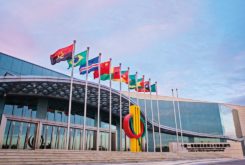The government of Mozambique has agreed a repayment plan with most of its creditors on its defaulted $727 million Eurobond and is also holding talks with the IMF over macro-economic reform. These are important steps on the road to economic stabilisation after the country’s high profile debt scandal. With coal and gas revenues set to increase massively over the next few years, Maputo should have every right to be optimistic. Yet it has still not revealed who approved $2 billion in secret loans, so the IMF is digging in its heels and is refused to resume lending.
With a step increase in export revenues due to filter through over the next decade, it might be surprising that the undeclared loans could destabilise the economy quite so much. Yet the damage inflicted has been as much reputational as fiscal. The scandal was well publicised: three state owned companies were found to have secretly taken out loans from Credit Suisse, BNP Paribas and VTB of Russia to fund the $850 million acquisition of tuna fishing boats and the $1.2 billion purchase of a radar surveillance network and patrol boats {link to the February 2018 CLBrief piece I wrote on this}. The deals were found to have been overvalued and $500 million seems to have disappeared.
The secret lending pushed national debt as a proportion of GDP beyond the limit set by the constitution: up to an eye watering 128.3% by the end of 2016. As a result, the IMF and 13 other bilateral and multilateral institutions froze many lending streams to the government and Maputo defaulted on its $727 million Eurobond repayments in January 2017. It also defaulted on repayments on Brazilian loans to state-owned Aeroportos de Mozambique, while it has fallen behind on its repayments to five governments: Angola, Bulgaria, Libya, Iraq and Poland. The revelations caused the value of the national currency, the metical, to tumble.
By this January, the state prosecutor had launched legal proceedings against officials in the three companies, but it was too late to ward off damage to Mozambique’s already shaky record on governance. The government was forced to cancel a bond issue planned for June because investors seemed scared off by the IMF’s attitude to the country. Credit ratings agency Fitch has cited the government’s “failure to cure the default on debt to external commercial creditors” for its current credit rating.
The planned deal
In early November, the government announced that it had agreed to pay 5% of its income from the two planned LNG projects in the north of the country to help settle the $727 million bond. Holders of the defaulted bonds will now be able trade them for new securities. The exact value to be paid will depend on LNG prices from the two schemes, although payments from the LNG – distinct from payments that will be paid directly by the government – will be capped at $500m. The new issue carries a much lower yield of 5.875% and has now been extended to 2033 to give Maputo more time to pay. It is likely that the government will pay about $900 million overall.
Finance Minister Adriano Maleiane said: “It’s a relief for the budget until the time we get additional revenue.” The deal is more favourable to creditors than the proposals submitted by the government earlier this year, but so far creditors accounting for just 60% of the debt have agreed to the terms. Another 15% need to sign up before the deal becomes binding. In addition, no restructuring deals on the hidden loans have yet been announced.
The IMF announced in October that Maputo had failed to explain where $500 million of the $2 billion loans had gone and so would not be holding talks with the government over the new financing. This prompted Maleiane to announce on 9 November that the government would hold another investigation into the undisclosed debt. He also said the government needed IMF support to sort out its finances, including switching more of its debt from expensive commercial lending to lower rate multilateral loans.
Economic progress
Although those responsible for the secret loans have not been identified, there has been substantial progress on key macroeconomic indicators. Inflation fell from a high of 26% in November 2016 to 6% by this June, as food price rises were brought under control despite subsidies being lifted on some food staples. In addition, the government’s international reserves have increased and the Bank of Mozambique has managed to cut its main lending rate by 6%.
The economy grew by 3.75% last year, higher than widely predicted, in large part because of a big increase in coal exports. Economic growth for the twelve months to the end of September stood at 3.4%, substantially lower than the government’s target of 5.3% for the whole of 2018. This is partly the result of erratic rainfall at the start of the year but the IMF expects growth of 3.5-4.0% for the whole of 2018.
An IMF team led by Ricardo Velloso that visited Mozambique in late July and early August praised reductions in bus, train, power, fuel and wheat subsidies and the introduction of an automatic fuel price adjustment mechanism. The Fund expects the recovery to be gradual rather than spectacular, with a hefty fiscal deficit of 8% of GDP for this year and describes the economic outlook as “challenging”. It reported: “Mozambique’s total public debt is on an unsustainable path…All debt burden indicators, except the ratio of external debt service to exports, surpass prudent thresholds for several years.”
The mission recommended an extension of VAT and prudent civil service wage spending, restricting new appointments to the most crucial sectors and minimising salary increases for senior executives. A new, strict loan approval procedure was set up in December 2017 but this will count for little if it not followed. Constitutional restrictions on the acquisition of new debt were ignored when the secret debts were agreed. It will take political will to give the new procedure real teeth.
President Filipe Nyusi has revealed that the IMF is advising on macroeconomic programmes and transparency even while lending is frozen. He said: “We are discussing all of this with the IMF with a view to unlocking this, bringing back credibility. Slowly, we have seen investors coming back. Not at the same level as we would like it to be.”
Another IMF mission visited Maputo for extended talks over mid-November. The Fund wants the 2019 budget to be based on “realistic” macroeconomic assumptions, including relying on highly concessional loans and external grants, rather than borrowing at commercial rates. The IMF’s resident representative for Mozambique, Ari Aisen, said: “We are going to continue supporting Mozambique in pursuit of good governance, transparency and accountability, which are part of a framework required for a stable microeconomic environment.”
Outlook
It would be wrong to pin all of Mozambique’s economic woes on the secret loans. Until relatively recently, coal and gas prices had been a lot weaker than expected for several years, leading to projects being delayed and the date for new government revenues repeatedly pushed back. Sovereign debt has been rising across the African continent over the past few years, so Mozambique is far from alone, but its sovereign has increased faster than almost anywhere else.
Banking sector difficulties have affected the wider economy, as the proportion of non-performing loans more than doubled to 11.4% between the start of 2015 and September 2017. The Bank of Mozambique had to liquidate Nosso Banco and put the country’s fourth biggest bank, Moza Banco, into administration. Attacks by Renamo forces in central Mozambique and an apparently Islamist group in the north may have dented investor confidence. Yet the government has not helped itself with its attitude to multiparty politics and critical journalists generating a lot of negative publicity.
With coal and gas exports set to increase massively over the next few years, the government should have every right to be optimistic. It could even replicate average annual economic growth of 7% over the period 2007-17 over the coming decade. In its World Economic Outlook, the IMF forecasts that annual growth will reach 11.1% in 2023 once LNG production has begun. However, the government says that it will only begin to benefit from substantial tax revenues from LNG production in the late 2020s.
President Nyusi must ensure that the truth on the $2 billion loans is revealed as quickly as possible, while much greater transparency will help to counter financial irregularities. Transparency International estimates that the country lost almost $5 billion to corruption in the twelve years up to 2014. High profile Mozambique observers fear that the country’s political elite is using their influence for their own economic gain.
Maputo needs to get its own house in order, not only to normalise relations with the IMF as soon as possible but also so that the country as a whole benefits from its natural resource boom. All this will help to stabilise its finances over the coming decade and also ensure that it is better positioned to handle the gas income when it finally arrives. It is far better to set high governance standards at the start, than to wait until financial impropriety has become ingrained.
13 November 2018



